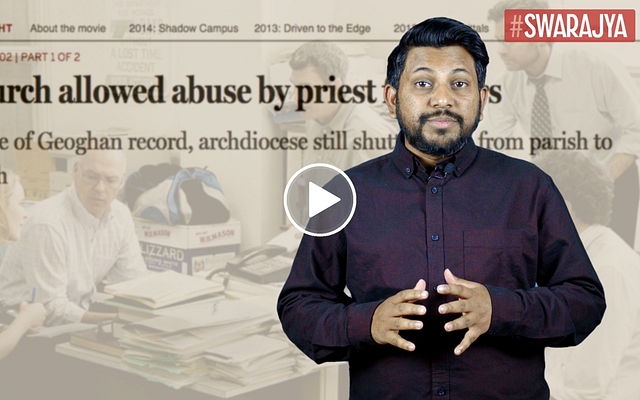
[Watch] Vatican Summit On Sexual Abuse: Why The Catholic Church Still Doesn’t Get It
Transcript:
I remember watching Spotlight, which won Best Picture at the 2016 Oscars, and feeling almost a gut punch at seeing the scale of cover-ups that have occurred on an institutional level in the Catholic church.
The most striking aspect of that investigation carried out by the Boston Globe in 2001-02 was that the crumbs led all the way up to the Vatican, clearly signifying that it wasn’t just a local issue or a series of stray cases here and there.
There was a problem, it was worldwide, and it was deep-rooted.
Since then, much has been uncovered about sexual abuse in the church and how – sadly – it’s been a routine affair.
Recall the investigation by Illinois Attorney General that revealed that the Catholic church hid the names of at least 500 priests who sexually abused minors.
Or when over 300 Christian priests were accused of sexually abusing more than 1,000 children in Pennsylvania.
Or when Pope Francis himself was accused of being involved in covering up sexual abuse by a disgraced cardinal.
Like I said, right to the top.
Although it took time for the tentacles to reach Asia, it has – and in a big way.
What rocked India last year was a series of cases such as that of a 34-year-old married woman in Kerala alleging that four priests had sexually abused her – and in the most insidious way: by using her confessional statement as a kind of blackmail.
What a shocking misuse of someone’s truth... and faith. But then, again, this is such an accurate reflection – the abuse scandal has plunged believers everywhere into a crisis of faith.
And this is not just ordinary unassuming children and women, but the rot has extended to the church’s own members – the nuns. When Bishop Franco Mulakkal, a senior member of the Roman Catholic clergy and head of its Jalandhar diocese, was accused of raping a Catholic nun 13 times between 2014 and 2016, a nun, Sister Anupama, and four of her companions from the Missionaries of Jesus congregation in Kerala rose in protest demanding Mulakkal’s protest.
Their fight is inspiring, but as you can imagine, speculations abound on how they have come under a lot of pressure and scrutiny for speaking out. In an interview with German news outlet DW recently, nun Anupama said, “Pressure works in discreet ways. Our movements are sometimes restricted; the money given to us is the bare minimum and we are being watched. So obviously, we can't live freely and are constantly watching our backs.”
Ordinary men and women who attend church, too, face this kind of a response when they speak up. “People would refuse to talk to us, to sit next to us during Mass. If I went to sit next to someone… they would get up and leave," said to the BBC a mother whose son told her one day that the parish priest had raped him.
The person in the dock is one of the Catholic church's most senior cardinals, Archbishop of Mumbai Oswald Gracias, who admitted he had to reflect on the fact that he didn’t alert the police immediately after the case of the rape of the boy was presented to him.
Gracias is now attending and addressing a four-day Vatican conference from 21st to 24th February, going on now as we speak, to talk about accountability in the church – accountability – it’s a bit rich, don’t you think? – but that is largely the theme of the conference: to discuss ways to fight sexual abuse of children by predatory Christian priests. The summit will have survivors speak about their pain, and for the clergy to just listen.
Now, if you think about it, this summit is an acknowledgement that the Vatican has a problem on its hands, and not just any problem – perhaps the biggest crisis for the institution in modern times – but here’s the thing: no amount of plans, “reflection points”, or handbooks can make up for, first and foremost, an apology, and an unconditional one – no expressions of regret, no saying things could have been handled better, none of that, but a clear admission that the institution has messed up and left a long trail of victims. And that they take responsibility for all of it. That would be a start: nothing short of a clear admission, then a genuine apology, and THEN an action plan on how to fix things going forward.
Anyway, isn’t that what the essence of confession is?